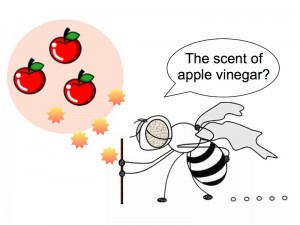Death of olfactory neurons determines aged-animal behavior Relationship between age-related neuronal death and animal behavior

In general, brain function including memory and cognition declines with aging. Age-related neuronal cell death has attracted attention as one cause of this decline and many researchers have studied cell death in neurodegenerative diseases. However, so far little attention has been paid to cell death in the normal aging process.

© 2014 Takahiro Chihara.
Cell death of olfactory neurons determines food-attraction behavior in aged flies.
In this study, Associate Professor Takahiro Chihara, Professor Masayuki Miura and their colleagues at the University of Tokyo Graduate School of Pharmaceutical Sciences, working with researchers at Chiba University (Assistant Professorr Ayako Tonoki), UCSD (Professor Jing Wang et al.) and the Scripps Institute (Professor Ronald Davis), revealed that death of select olfactory neurons is responsible for age-related alteration of animal behavior. First of all, the researchers discovered that certain olfactory neurons that respond to smell of apple vinegar in the brain of aged Drosophila fruit flies were dead. Young flies flock to the location of apple vinegar by sensing its smell, but aged flies were not able to sense the smell of apple vinegar and consequently not able to locate the apple vinegar. However, when flies that were engineered so that cell death did not occur in these olfactory neurons, even aged flies were able to sense and locate apple vinegar.
This study has made it possible to describe changes in an individual’s behavior due to aging as a direct result of the cell death of specific neurons. In the future, in searching to understand why particular olfactory neurons undergo cell death in the course of normal aging, this research may lead to an understanding of the causes of neuronal cell death in the neurodegenerative diseases and even the pathogenesis of those diseases.
Press release (Japanese)
Paper
Takahiro Chihara, Aki Kitabayashi, Michie Morimoto, Ken-ichi Takeuchi, Kaoru Masuyama, Ayako Tonoki, Ronald L. Davis, Jing W. Wang and Masayuki Miura,
“Caspase Inhibition in Select Olfactory Neurons Restores Innate Attraction Behavior in Aged Drosophila”,
PLOS Genetics Online Edition: 2014/6/26, doi: 10.1371/journal.pgen.1004437.
Article link
Links
Graduate School of Pharmaceutical Sciences
Department of Genetics, Graduate School of Pharmaceutical Sciences






